Lighting & Energy Efficiency Calculators
Unlock smarter greenhouse planning with our Lighting & Energy Efficiency Calculators. Whether you’re optimizing light for crops in a photovoltaic greenhouse or comparing HPS and LED systems for supplemental lighting, these tools help you balance crop yield, energy use, and costs. Designed for informed decision-making, they support both sustainable design and efficient production.
1.Lighting Calculator
Supplemental lighting greenhouse system is increasingly used for crops such as cannabis or tomatoes. However, the investment is very high and the operating costs are significant. The difference between HPS (High Pressure Sodium) and LED is not easy: HPS requires less investment but electricity consumption is higher and more heat is generated. It determines the amount of light required for plants to grow efficiently.
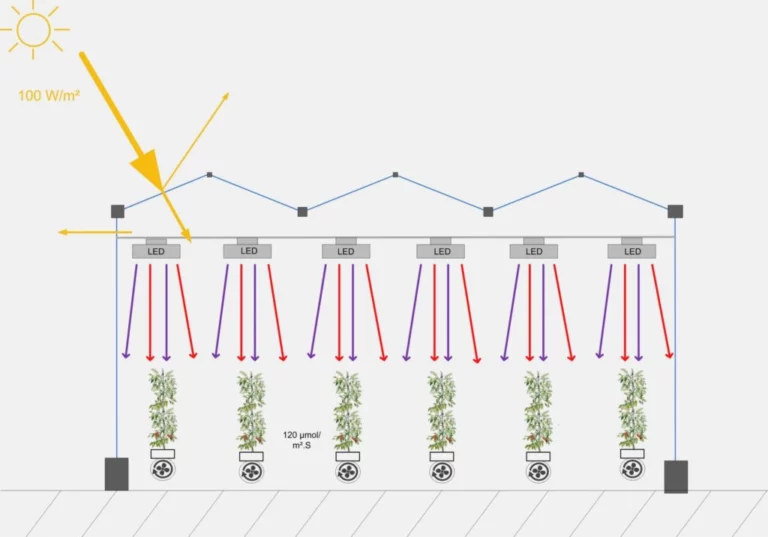
How does a light calculator for PV greenhouse work?
Hortinergy PV considers:
- Sun position: hourly position
- Greenhouse dimension, type, orientation…
- Structure (PV panel, frame) shade / transparency, absorption and inner/outer reflexion based on material properties
- Solar /PAR transmission of transparent cover material properties
- Shade from one chapel to another chapel according to sun position, cover…
- Crop and soil reflexion (including multi-reflexion to/from frame and transparent cover from/to canopy)
- Solar radiation /PAR going outside the greenhouse (roof, sides)
2. Input parameters in the greenhouse lighting calculator
Input parameters are:
- LED and HPS specification: lighting intensity, efficiency…
- Regulation setpoints:
- Day Light Integral (DLI) and minimum ‘’night’’ hour per day,
- or fixed monthly calendar,
- beyond which solar radiation, the lighting system is desactivated,
- Specification of the transparent cover of the greenhouse,
- Specification of the blackout and shading screens and their adjustment points,
- GPS position to generate a weather file.
An example is shown below:
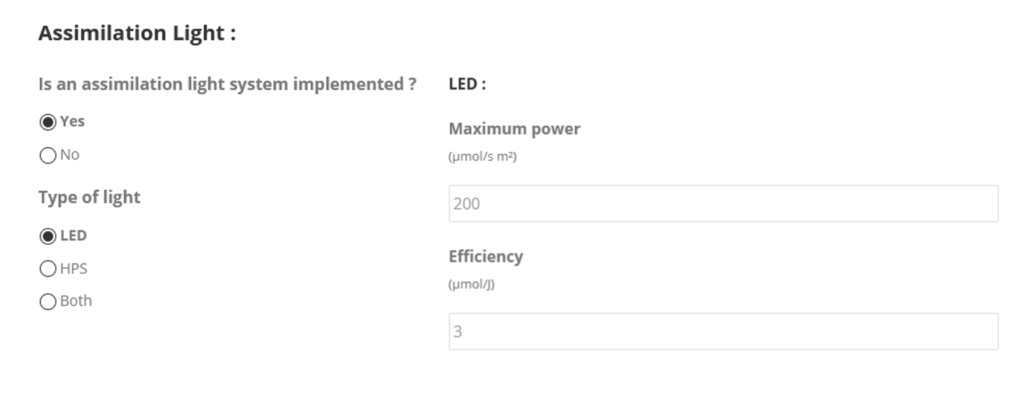
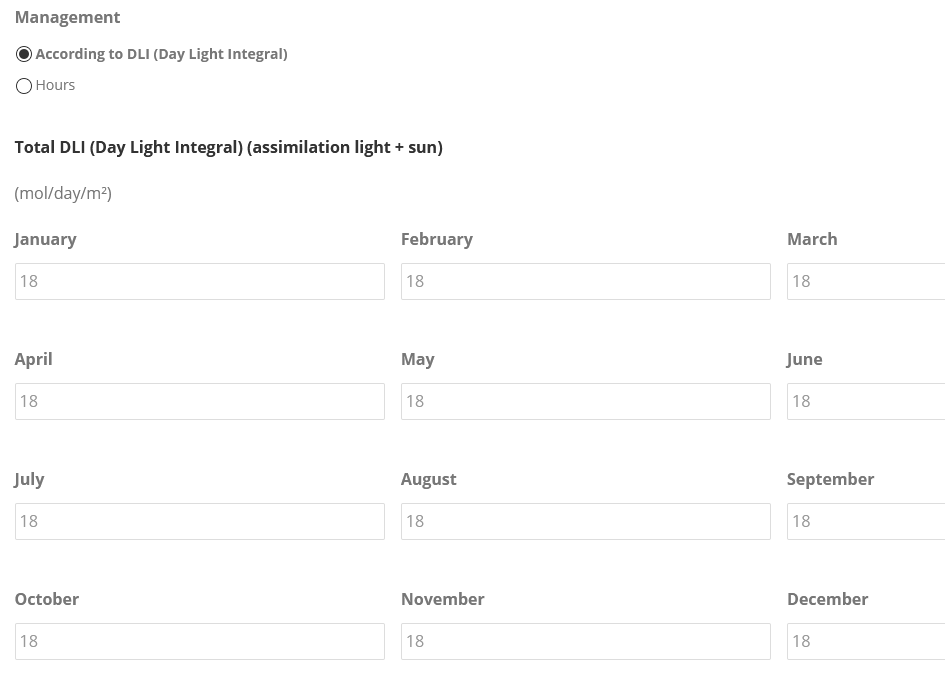
You can also define the blackout screen and its regulation setpoints as shown below:
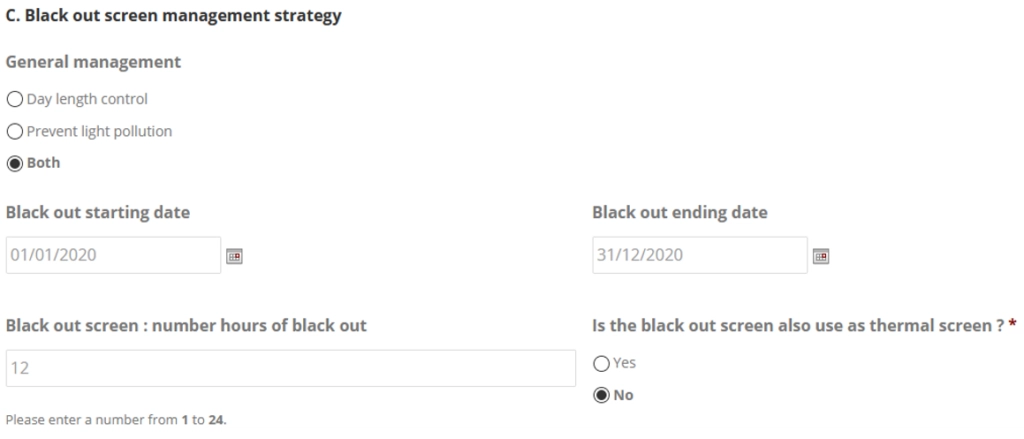
3. Results
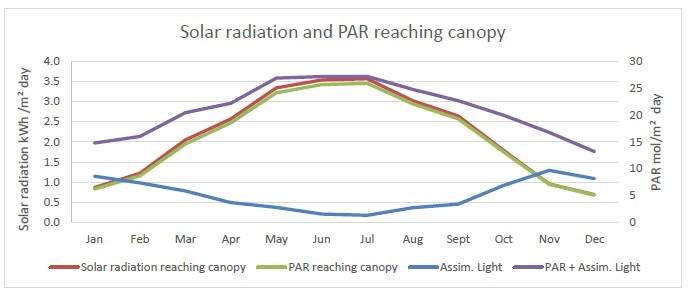
Hortinergy simulates your project for one year as a virtual greenhouse.
The results are:
- Solar radiation transmitted through the transparent cover and reaching the canopy,
- Supplemental lighting greenhouse required according to regulation setpoints (mol/m²/day):
- Day Light Integral (DLI),
- or fixed monthly schedule,
- Electricity consumption,
- Impact on the inner climate and energy consumption: heating, cooling, dehumidification.
The reports are:
- a pdf document with typical days and monthly summary tables
- an Excel file with hourly data for deeper analysis.
Solar radiation reaching canopy and supplemental lighting required
Hortinergy simulates on an hourly basis the solar radiation reaching canopy and the additional assimilation lighting required to reach the DLI.
The example below shows a monthly summary:
Impact on the inner climate and energy consumption
Hortinergy models the impact of supplementary lighting on the inner climate and energy consumption (heating, cooling, dehumidification, lighting and ventilation).
The example below shows the crop transpiration and a higher inner temperature when HPS assimilation lighting is switched on from to 9 to 11 AM and 4 to 9 PM to reach DLI.
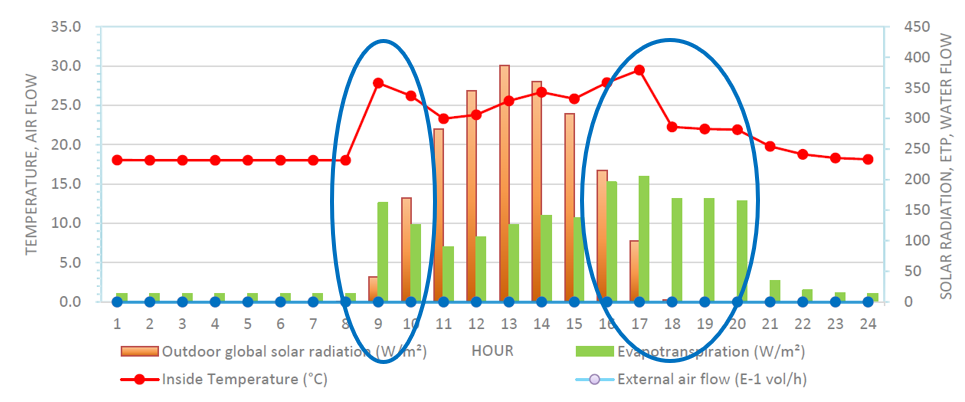
Electricity consumption and expenditures
Hortinergy also shows the electricity consumption and expenditures.
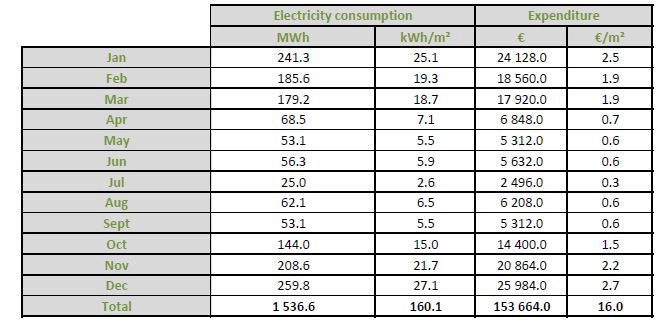
Hortinergy has been developed by Agrithermic in partnership with the CTIFL (French Interprofessional Technical Centre for Fruits and Vegetables) and Astredhor (Horticultural technology institute), Agrocampus Ouest and the agricultural high school of La Cote saint André (CFPPA).
2. PV Greenhouse Calculator
A light calculator for PV greenhouse (photovoltaic) simulates light, solar radiation, PAR and DLI reaching canopy in a solar greenhouse.
Nowadays, energy mix and renewable energy are crucial issues. Photovoltaic greenhouses are a part of the solution. However, most of projects are designed to maximise electricity generation without considering crop production.
Therefore, they often fail agronomically due to a lack of light / PAR radiation inside the greenhouse.
Hortinergy PV helps to size the photovoltaic greenhouse to find the best combination between crop production and electricity generation.
How does a light calculator for PV greenhouse work?
Hortinergy PV considers:
- Sun position: hourly position
- Greenhouse dimension, type, orientation…
- Structure (PV panel, frame) shade / transparency, absorption and inner/outer reflexion based on material properties
- Solar /PAR transmission of transparent cover material properties
- Shade from one chapel to another chapel according to sun position, cover…
- Crop and soil reflexion (including multi-reflexion to/from frame and transparent cover from/to canopy)
- Solar radiation /PAR going outside the greenhouse (roof, sides)
Inputs of the PV greenhouse calculator are:
- Greenhouse dimension, type, orientation, shape, symmetrical/ asymmetrical
- PV panel specification: single or double face, transparency
- Transparent cover specification
Outputs of the PV greenhouse simulator are:
- average hourly radiation / DLI reaching canopy in an Excel file
- monthly summary in a PDF report
Need more accurate light simulation for your PV greenhouse?
We can provide, with Hortinergy PV Desktop, advanced calculation.
Input: any patchwork combining any types of solar panel and / or transparent cover.
Outputs: User designs a grid in the greenhouse. Software calculates solar radiation reaching canopy at any locating of the defined grid for a specific height. Output is an Excel file with hourly of solar radiation / PAR in each point of the grid.
Hortinergy is an online software. You can choose your offer, create an account and start your project!

